(3) Supporting the Countries Referred to as “the Global South” Facing Serious Impacts
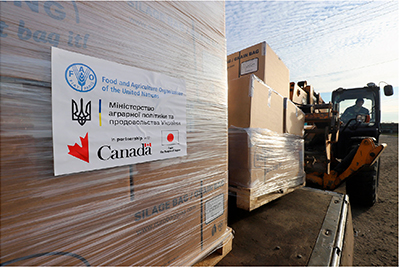
Relief supplies arriving in Lviv Oblast in western Ukraine via FAO to support the expansion of Ukraine’s grain storage capacity (Photo: FAO)
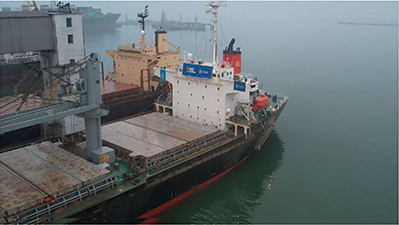
Ukrainian wheat being transported to Somalia, a country facing the food crisis, with the assistance of WFP (Photo: Ukrainian Sea Ports Authority)
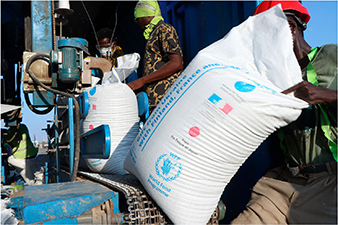
Ukrainian wheat arriving in Somalia and being packed in bags marked with Japan’s national flag (Photo: ©WFP/Jamal Ali)
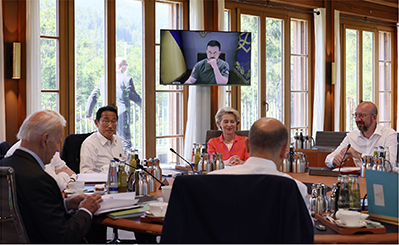
Prime Minister Kishida participating in the session on the situation in Ukraine at the G7 Elmau Summit (June 27, 2022) (Photo: Cabinet Public Relations Office)
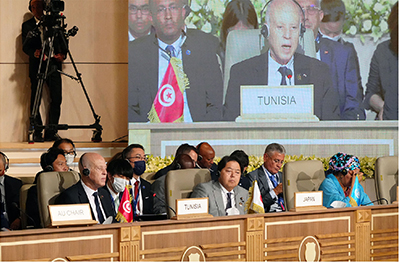
Foreign Minister Hayashi co-chairing TICAD 8 (August 27, 2022)
Russia’s aggression against Ukraine shakes the very foundations of the existing international order and its consequences spread worldwide. In particular, it inflicts additional damage on economies and societies of developing countries, which are already facing many difficulties.
On the occasion of the G7 Summit in March, Prime Minister Kishida expressed concern that Russia’s aggression against Ukraine was fueling the price increase in energy and food, and stated the need for assistance for the affected countries and the importance of moving into action to ensure energy and food security. In May, at the G7 Development Ministers Meeting held in Berlin, Germany, which then State Minister for Foreign Affairs Suzuki attended, the “Statement by the G7 Development Ministers on the global effects of Russia’s war of aggression against Ukraine, and the G7’s comprehensive support for Ukraine, affected neighboring countries as well as countries of the Global South” was issued.
In June, Foreign Minister Hayashi attended the Ministerial Conference “Uniting for Global Food Security” hosted by Germany as a response to the global food security affected by the situation in Ukraine. In the presence of attendees from key donor states including the G7, as well as countries affected by food crises and international organizations, Foreign Minister Hayashi introduced Japan’s efforts, including emergency humanitarian assistance through WFP to Yemen and Sri Lanka, both of which were facing increasingly serious food crises due to Russia’s aggression against Ukraine, and agricultural assistance to Ukraine through FAO. Foreign Minister Hayashi also stated that Japan was looking into providing further assistance and would continue to provide support correspondent to the needs of affected countries.
At the G7 Elmau Summit held in Germany in June, Prime Minister Kishida emphasized the importance of showing solidarity, through concrete assistance to the countries actually in food crises. In this context, he announced additional assistance in response to the global food crisis, totaling approximately 200 million US dollars, Note 8 mainly in the form of food assistance aimed for countries in Africa and the Middle East. In July, as an embodiment of this announcement, Japan decided to provide assistance bilaterally and through UN agencies and Japanese NGOs. It included the provision of food assistance and production capacity building for countries facing food shortages, emergency food assistance to countries in the Middle East and Africa, as well as support for the promotion of grain exports from Ukraine.
Furthermore, at TICAD 8 held in Tunisia in August, Prime Minister Kishida pointed out that the food crisis in Africa was becoming more serious than ever. He announced that, in response to this situation, Japan would co-finance approximately 300 million US dollars with the African Development Bank’s African Emergency Food Production Facility to bolster medium- to long-term food production capacity in Africa. Prime Minister Kishida also announced that Japan would continue to provide assistance aimed at strengthening the African countries’ own grain production capacity and improving the income of smallholder farmers by further cultivating the skills of 200,000 people in the agricultural field. It would include such initiatives as the Coalition for African Rice Development (CARD) (see “Stories from the Field 4”) and the Smallholder Horticulture Empowerment & Promotion (SHEP).
At the G20 Summit in Bali, Indonesia, held in November, Prime Minister Kishida once again emphasized the need for urgent action to ensure food and energy security. Prime Minister Kishida explained Japan’s efforts to date to address the global food crisis caused by the Russia’s aggression against Ukraine, and stated that Japan would further enhance its emergency assistance, including food assistance to countries severely affected by rising food and energy prices in Asia, Africa and the Middle East. As an example to embody this commitment, Japan decided to provide an Emergency Grant Aid of 14 million US dollars in order to transport Ukrainian wheat from the Odesa Port to Somalia for distribution in collaboration with WFP. It was implemented in response to Ukrainian President Zelenskyy’s announcement at the UN General Assembly in September to donate Ukrainian wheat to Ethiopia and Somalia.
The consequences of the prolonged situation surrounding Russia and Ukraine continue, increasing the need for assistance. As a measure to maintain and strengthen a peaceful and stable international order, Japan strives to support not only Ukraine and its neighboring countries but also developing countries in Asia, the Pacific Island region, the Middle East, and Africa.
- Note 8: Including the 17 million US dollars in assistance via FAO described in “(2) Support for the Stability and Reconstruction of Ukraine.”
